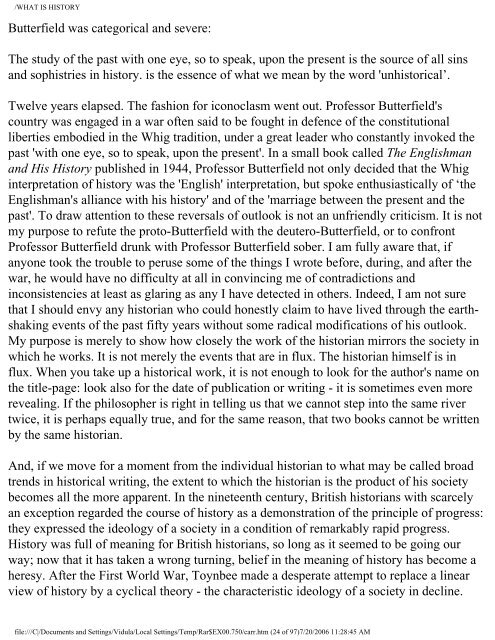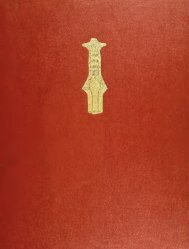What is History / by Edward Hallett Carr - Universal History Library
What is History / by Edward Hallett Carr - Universal History Library
What is History / by Edward Hallett Carr - Universal History Library
Create successful ePaper yourself
Turn your PDF publications into a flip-book with our unique Google optimized e-Paper software.
WHAT IS HISTORY<br />
Butterfield was categorical and severe:<br />
The study of the past with one eye, so to speak, upon the present <strong>is</strong> the source of all sins<br />
and soph<strong>is</strong>tries in h<strong>is</strong>tory. <strong>is</strong> the essence of what we mean <strong>by</strong> the word 'unh<strong>is</strong>torical’.<br />
Twelve years elapsed. The fashion for iconoclasm went out. Professor Butterfield's<br />
country was engaged in a war often said to be fought in defence of the constitutional<br />
liberties embodied in the Whig tradition, under a great leader who constantly invoked the<br />
past 'with one eye, so to speak, upon the present'. In a small book called The Engl<strong>is</strong>hman<br />
and H<strong>is</strong> H<strong>is</strong>tory publ<strong>is</strong>hed in 1944, Professor Butterfield not only decided that the Whig<br />
interpretation of h<strong>is</strong>tory was the 'Engl<strong>is</strong>h' interpretation, but spoke enthusiastically of ‘the<br />
Engl<strong>is</strong>hman's alliance with h<strong>is</strong> h<strong>is</strong>tory' and of the 'marriage between the present and the<br />
past'. To draw attention to these reversals of outlook <strong>is</strong> not an unfriendly critic<strong>is</strong>m. It <strong>is</strong> not<br />
my purpose to refute the proto-Butterfield with the deutero-Butterfield, or to confront<br />
Professor Butterfield drunk with Professor Butterfield sober. I am fully aware that, if<br />
anyone took the trouble to peruse some of the things I wrote before, during, and after the<br />
war, he would have no difficulty at all in convincing me of contradictions and<br />
incons<strong>is</strong>tencies at least as glaring as any I have detected in others. Indeed, I am not sure<br />
that I should envy any h<strong>is</strong>torian who could honestly claim to have lived through the earthshaking<br />
events of the past fifty years without some radical modifications of h<strong>is</strong> outlook.<br />
My purpose <strong>is</strong> merely to show how closely the work of the h<strong>is</strong>torian mirrors the society in<br />
which he works. It <strong>is</strong> not merely the events that are in flux. The h<strong>is</strong>torian himself <strong>is</strong> in<br />
flux. When you take up a h<strong>is</strong>torical work, it <strong>is</strong> not enough to look for the author's name on<br />
the title-page: look also for the date of publication or writing - it <strong>is</strong> sometimes even more<br />
revealing. If the philosopher <strong>is</strong> right in telling us that we cannot step into the same river<br />
twice, it <strong>is</strong> perhaps equally true, and for the same reason, that two books cannot be written<br />
<strong>by</strong> the same h<strong>is</strong>torian.<br />
And, if we move for a moment from the individual h<strong>is</strong>torian to what may be called broad<br />
trends in h<strong>is</strong>torical writing, the extent to which the h<strong>is</strong>torian <strong>is</strong> the product of h<strong>is</strong> society<br />
becomes all the more apparent. In the nineteenth century, Brit<strong>is</strong>h h<strong>is</strong>torians with scarcely<br />
an exception regarded the course of h<strong>is</strong>tory as a demonstration of the principle of progress:<br />
they expressed the ideology of a society in a condition of remarkably rapid progress.<br />
H<strong>is</strong>tory was full of meaning for Brit<strong>is</strong>h h<strong>is</strong>torians, so long as it seemed to be going our<br />
way; now that it has taken a wrong turning, belief in the meaning of h<strong>is</strong>tory has become a<br />
heresy. After the First World War, Toynbee made a desperate attempt to replace a linear<br />
view of h<strong>is</strong>tory <strong>by</strong> a cyclical theory - the character<strong>is</strong>tic ideology of a society in decline.<br />
file:///C|/Documents and Settings/Vidula/Local Settings/Temp/Rar$EX00.750/carr.htm (24 of 97)7/20/2006 11:28:45 AM







